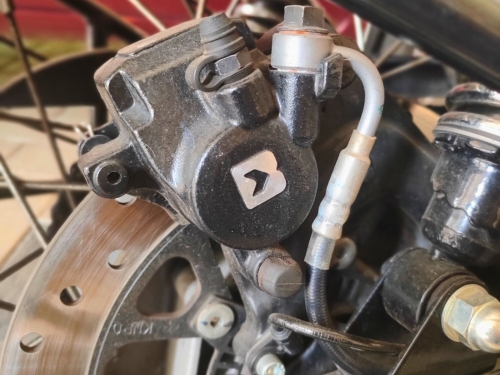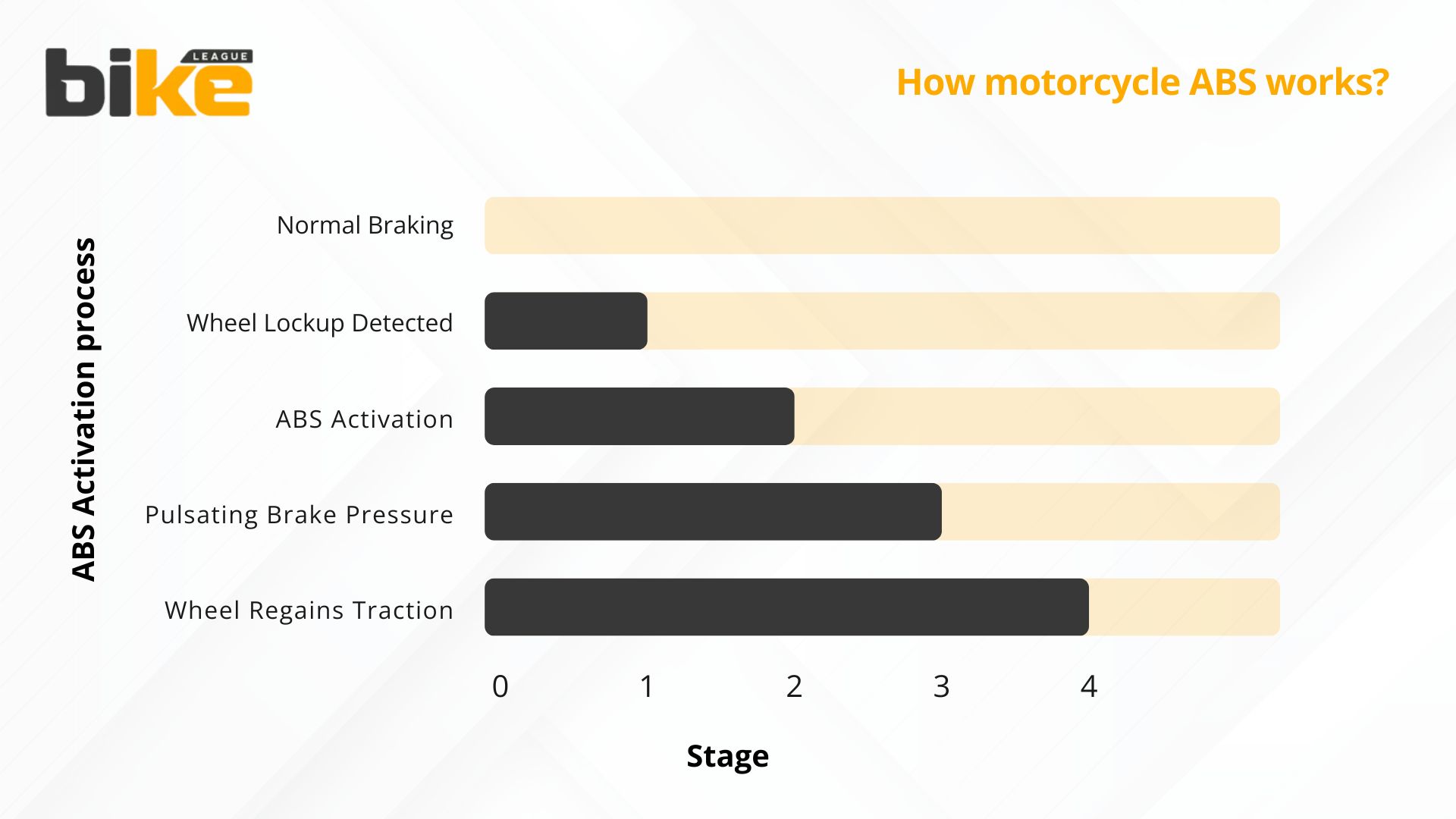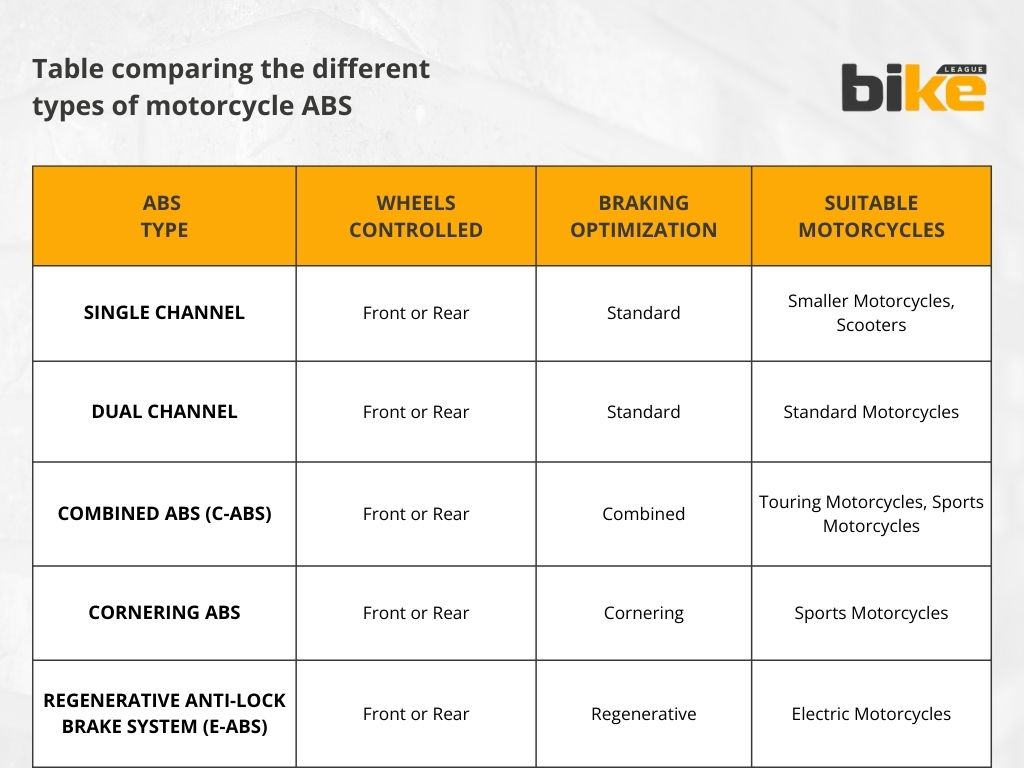
Long story short – Get all doubts about motorcycle ABS right here, and we will explain in the simplest terms.
Key Takeaways
- ABS avoids wheel locking, which contributes to a significant percentage of accidents.
- Motorcycle ABS prevents wheel lock-up by modulating brake pressure through sensors and a control unit, ensuring stability and maximum braking force. Riders may feel a slight pulsing when active.
- Single-Channel ABS,Dual-Channel ABS,Combined ABS (C-ABS),Cornering ABS,Regenerative Anti-lock Brake System (eABS) are the types of abs
- Motorcycle ABS improves safety by reducing stopping distance, preventing tire locking, and minimizing skidding in various conditions, ensuring better stability. However, it comes with drawbacks like increased cost, added kerb weight, a less engaging ride experience, and higher maintenance expenses.
ABS, or anti lock braking system, is becoming standard in most Indian motorcycles except for commuters. Thanks to the rule brought out by the Honorable Government of India, which has brought the prices up but also the safety of the rider, ABS avoids wheel locking, which contributes to a significant percentage of accidents. However, several misconceptions about ABS exist, and we are here to clear them also we delve in to the types of anti lock braking system.
How Motorcycle ABS works?
- Wheel Speed Sensors: Each wheel has a speed sensor attached to it, which continuously monitors the wheel’s rotational speed.
- Control Unit: The ABS control unit receives data from the wheel speed sensors. It analyzes this data to determine if a wheel is about to lock up.
- Hydraulic Pump and Valves: If the control unit detects an impending lockup, it signals the ABS hydraulic pump and valves to regulate brake pressure.
- Pressure Modulation: The ABS pump and valves rapidly reduce and increase brake pressure, creating a pulsating effect. This prevents the wheel from completely locking up while maintaining maximum braking force
- Rider Feedback: The rider may feel a slight pulsing sensation in the brake lever or pedal during ABS activation. This is normal and indicates the system is working correctly.
What are the different types of motorcycle ABS?
- Single-Channel ABS: This is the most basic type of ABS, which operates on the front or rear wheel only. Single-channel ABS is often found on smaller motorcycles and scooters.
- Dual-Channel ABS: As the name suggests, dual-channel ABS operates independently on both the front and rear wheels. This provides better control and stability for motorcycles that require more precise braking.
- Combined ABS (C-ABS): C-ABS integrates the ABS system with the motorcycle’s braking system, allowing the rider to apply both brakes simultaneously and distribute braking force effectively.
- Cornering ABS: This advanced ABS system is designed to optimize braking performance while cornering. It considers the motorcycle’s lean angle and adjusts brake pressure accordingly to maintain stability and prevent loss of control.
- Regenerative Anti-lock Brake System (eABS): This system is specifically designed for electric motorcycles. It utilizes regenerative braking to recapture energy while applying ABS, improving efficiency and extending range.
What is the difference between dual-channel ABS and single-channel ABS
Dual-channel ABS has sensor units in the front and rear, while Single-channel ABS consists of only one wheel speed sensor in the front section.
What is switchable ABS?
Switchable ABS allows the rider to disable rear-wheel ABS to make the ride adventurous and exciting for experienced riders, especially in off-road conditions.
Advantages of Motorcycle ABS
- Reduces stopping distance.
- Averts locking of tyres.
- Prevents skidding of motorcycle in all sorts of conditions.
- Improved vehicle stability.
Disadvantages of Motorcycle ABS
- Increases the cost of a motorcycle.
- Added kerb weight.
- Ride becomes less entertaining.
- High maintenance cost.
Misconceptions about motorcycle ABS in India
1. ABS Reduces Braking Power
One of the most common misconceptions is that ABS makes the brakes less powerful. This is not true. ABS is designed to prevent wheel lockup during hard braking, not to reduce braking power. In fact, ABS allows riders to apply maximum braking force without the risk of skidding, which improves stopping performance in many situations.
2. ABS is Always Active
There’s a misconception that ABS is constantly engaged during riding. ABS only activates during sudden or hard braking situations where wheel lockup is imminent. During everyday riding and gentle braking, the system remains inactive, allowing regular brake operation.
3. ABS Eliminates the Need for Braking Skills
Some riders believe that having ABS means they don’t need to develop proper braking techniques. This is a dangerous misconception. Experts emphasize that ABS should be seen as a tool to enhance safety, not as a substitute for riding skills and experience. Riders are encouraged to develop their braking skills and judgment, as ABS is most effective with good riding practices.
4. ABS Makes Riding Less Enjoyable
Some enthusiasts believe that ABS diminishes the thrill of riding, particularly for those who enjoy more adventurous or sporty riding styles. This misconception fails to recognize that ABS primarily engages in emergencies and doesn’t significantly alter the everyday riding experience.
5. ABS is Only Beneficial on Wet or Slippery Roads
While ABS is highly effective in challenging road conditions, some riders mistakenly believe it’s only useful in wet or slippery conditions. In fact, ABS provides significant benefits in all road conditions, including dry pavement, by preventing wheel lockup and maintaining stability during hard braking.
6. ABS Increases Stopping Distance
Contrary to this belief, ABS can reduce stopping distances under certain conditions. By preventing wheel lockup, ABS allows maximum braking force to be applied consistently, leading to shorter stopping distances, especially on slippery surfaces.
7. ABS is Too Complex and Prone to Failure
Some riders are intimidated by the perceived complexity of ABS and worry about system failures. However, modern ABS systems are highly reliable and designed to function effectively with minimal maintenance. In the rare event of a system failure, the brakes typically default to normal operation without ABS assistance.
8. ABS is Unnecessary for Experienced Riders
There’s a misconception that experienced riders don’t need ABS because they have advanced braking skills. However, studies have shown that ABS can benefit riders of all skill levels, including experienced ones, by providing an additional layer of safety in unpredictable emergency situations.
9. ABS Significantly Increases Motorcycle Cost
While it’s true that ABS does add to the cost of a motorcycle, the perception that it significantly increases the overall price is often exaggerated. The safety benefits and potential reduction in insurance costs can offset the initial price increase over time.
10. ABS Prevents All Types of Accidents
Some riders mistakenly believe that ABS can prevent all types of accidents. While ABS is highly effective in reducing inevitable crashes, particularly those related to braking and skidding, it’s not a panacea for all road safety issues. Riders must still practice safe riding techniques and remain vigilant on the road.
What are the latest technological advancements in motorcycle ABS?
1. Enhanced ABS Systems
Technological advancements have led to the development of enhanced ABS systems, including features like Traction Control, Hill Hold Control, and Rear-wheel Lift-up Mitigation. These features contribute to a safer and more comfortable riding experience.
2. Modular and Scalable Systems
The latest generation of ABS systems, such as Bosch’s generation 9, are modular and scalable, making them suitable for a wide range of vehicle classes, including small bikes and scooters.
3. Integration with Electronic Sensors
Modern ABS systems are increasingly integrated with electronic sensors and brake modulators, further boosting their effectiveness and reliability.
How do enhanced ABS features like Traction Control and Hill Hold Control work with standard ABS?
Enhanced ABS features like Traction Control and Hill Hold Control work with standard ABS in motorcycles to provide a comprehensive safety system. Here’s how they integrate:
Traction Control System (TCS)
Traction Control Systems prevent the rear wheel from losing traction by modulating power output, particularly useful when accelerating on slippery surfaces or when the motorcycle is leaning. TCS integrates with ABS in the following ways:
- Shared Components: TCS often shares the same control module and sensors as the ABS system, including wheel speed sensors.
- Wheel Spin Detection: The system compares the speed of the front and rear wheels to detect discrepancies that might indicate a loss of traction.
- Intervention Methods: When wheel spin is detected, TCS can:
- Electronically adjust the throttle position.
- Alter ignition timing
- Cut fuel supply to one or more cylinders.
- ABS Integration: TCS can use the ABS components to apply brake force to spinning wheels, helping to regain traction.
Hill Hold Control (HHC)
Hill Hold Control prevents the motorcycle from rolling backwards when starting on an incline. Its integration with ABS includes:
- Sensor Utilization: HHC uses the motorcycle’s angle and wheel speed sensors, often part of the ABS system.
- Brake Application: When the bike is stationary on a slope, HHC engages the brakes automatically.
- ABS Integration: HHC is typically integrated with the motorcycle’s ABS, utilizing existing brake control mechanisms to apply and release the brakes as needed.
The integration of these systems creates a comprehensive safety package that enhances motorcycle control and stability:
- Shared Components: All three systems often share the same control module, sensors, and actuators, allowing seamless integration and coordinated responses.
- Complementary Functions: While ABS focuses on preventing wheel lockup during braking, TCS prevents wheel slip during acceleration, and HHC assists with starts on inclines.
- Enhanced Safety: Combining these systems significantly improves overall safety. For example, studies have shown that ABS alone can reduce fatal crashes by 37% in motorcycles. When combined with TCS and HHC, the safety benefits are further amplified.
- Real-World Application: In challenging scenarios, such as accelerating on a wet incline, these systems work together seamlessly:
- TCS manages wheel spin during acceleration
- HHC prevents rollback when starting
- ABS ensures effective braking if needed
- The A to Z guide of motorcycle alloy & spoke wheels
- Different types of bike clutch explained
- What all basic motorcycle accessories should a rider have
- Buying guide for motorcycle gloves in India
- Ask Us
This integration ensures motorcycles can handle challenging terrains and manoeuvres more safely and effectively, reducing accident rates and severity.
Does ABS activate each time when we brake?
ABS comes into play only when sudden hard brakes are applied. The rider can feel increased resistance on brake levers while ABS is on.
Does Motorcycle ABS provide 100% safety?
No. However, not in every scenario does ABS help the rider escape tight situations and lose motorcycle control. It brings an extra layer of safety for the rider.
How does ABS feel for the motorcycle rider?
Rider will feel a vibration or rattle at the lever accompanied by some sound from the brakes, which is very normal. With ABS, a hard pull on the brake lever will bring your bike to a safe stop. Do not let go of the lever when there is pulsation or vibration in the lever. Keep the pressure on the lever steady until the bike has slowed.
When was motorcycle ABS introduced in India?
Motorcycle ABS was first introduced in India in 2011 when TVS Motor Company launched the Apache RTR 180 ABS. This was a significant milestone in Indian motorcycle safety, making India one of the first Asian countries to mandate ABS on two-wheelers.
Is ABS mandatory for all two wheelers in India?
Yes, ABS is mandatory for all two-wheelers sold in India with an engine capacity of 125cc or above. This rule has been in effect since April 1, 2019. For two-wheelers with an engine capacity of less than 125cc, a combined braking system (CBS) is mandatory. CBS is a system that links the front and rear brakes together so that some of the braking force is also used on the front wheel when you apply the rear brake. This helps prevent the front wheel from locking up, which can lead to losing control.
FAQ related to motorcycle ABS
1. What is the difference between Two-wheeler ABS and CBS?
CBS can work on the disc-drum combo, while the ABS works only on the disc brake combo. ABS improves and reduces braking distance, while CBS reduces rider reaction time.
2. Is there a driving style change needed while ABS is fitted?
No change in driving style is required.
3. What if the motorcycle ABS unit fails?
If any components fail, they are switched off automatically without affecting the brakes’ normal operation.
4. Does ABS improve braking performance?
ABS won’t magically improve your braking performance. It would help if you continued estimating braking distances, as ABS only helps avoid wheel lockup. That’s all
5. Does ABS work the same in all road conditions?
ABS is more efficiently triggered on rough or loose surfaces. The rule is simple: the lower the grip available, the sooner ABS will engage. Conversely, stickier tyres on a smooth surface will generally reduce ABS intervention levels.
6. Can a motorcycle with abs do a stoppie?
No. You cannot do a stoppie on a motorcycle with ABS on. It would help if you switched off ABS, so the bike needs switchable ABS.
7. Do all motorcycles have ABS?
Starting from 2019 onwards, ABS is not mandatory for motorcycles under 150cc. However, it is a standard requirement for motorcycles above 150cc.
Misconceptions about bike ABS
1. ABS makes brakes less powerful
An ABS does not lessen the brakes’ effectiveness. It increases the preventing power and reduces the preventing distance.
2. ABS is beneficial handiest on wet surfaces
In motorcycles and scooters, ABS may be effective in various road conditions, including moist, dry, and choppy terrain. Irrespective of the sort of terrain, ABS is observed to be more potent than motorcycles without ABS.
3. ABS is unnecessary as we all recognize a way to brake
An anti-lock brake system is designed to offer a further layer of protection and safety during hard braking. Even skilled riders can stumble upon sudden situations or make errors, and ABS can help mitigate the consequences.
4. ABS is best for beginners
The Anti-Lock Braking System gives riders self-belief by mitigating the possibility of slipping due to harsh braking. ABS is an important safety function for all motorcycle riders, whether skilled or beginner.
5. ABS increases the bike’s weight
The extra weight of an anti-lock braking system is negligent. It might not impact the overall bike’s balance and management.
Other related articles from Bikeleague India Team
Conclusion
If you have any other doubts or queries, email us at bikeleague2017@gmail.com or share your doubts or opinions in the comments section below. We are always eager to help and assist you. Also, here are several social media platforms of Bikeleague India to raise your suspicions.



